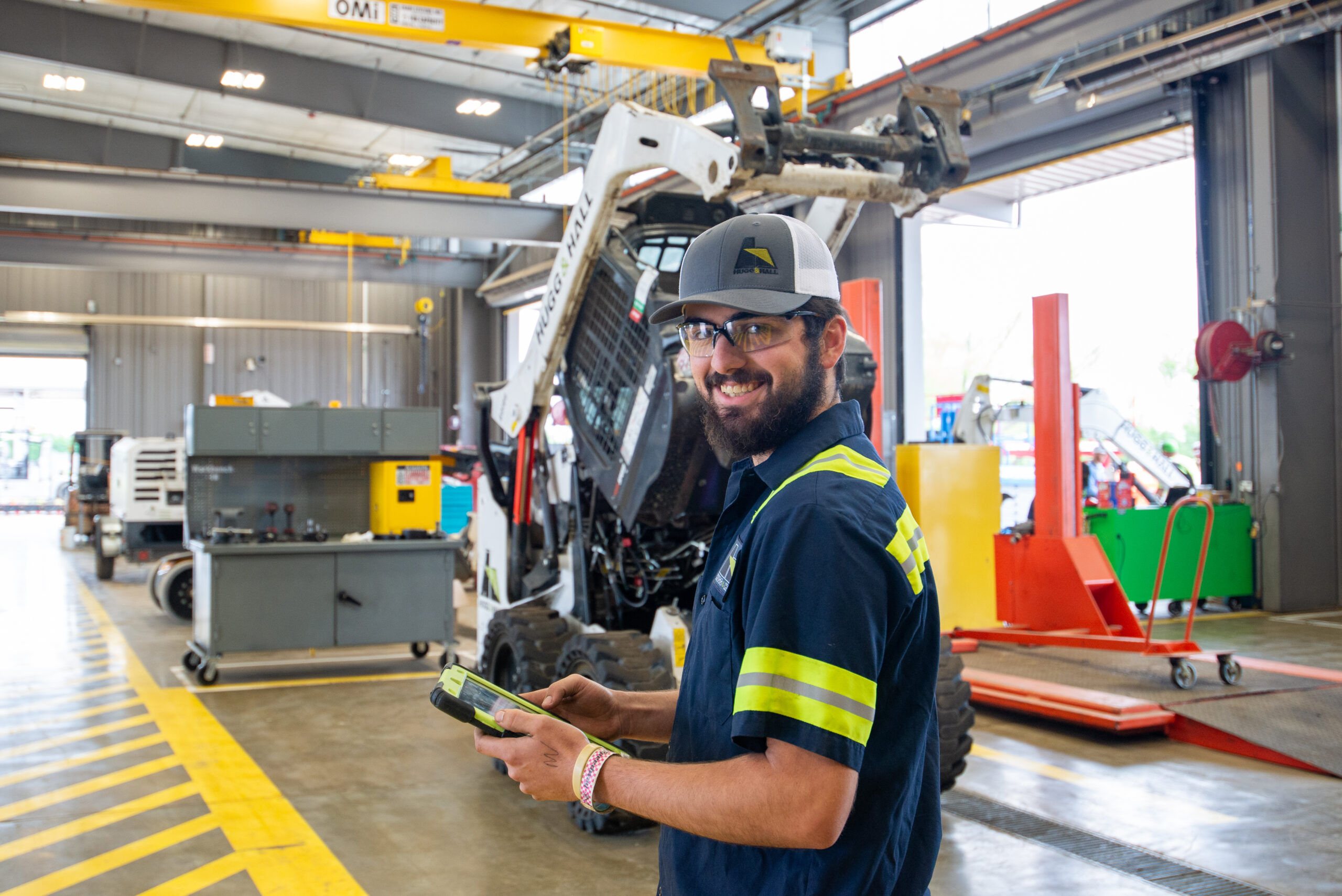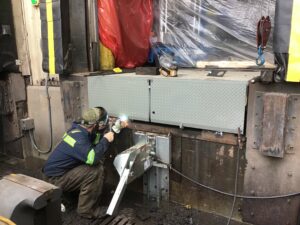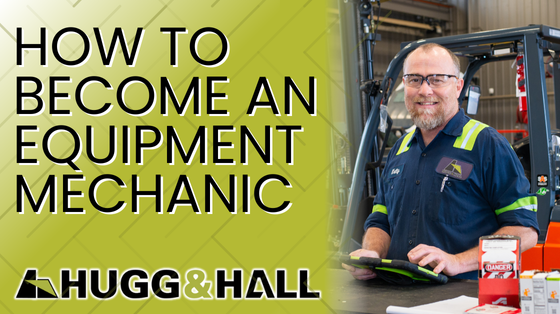
How to Become an Equipment Mechanic
Wondering how to become an Equipment Mechanic? Learn how you can become a technician in a great industry!
What do Equipment Mechanics do?
Broadly, they fix equipment.
But tech jobs differ a lot based on what they work on, and where they work on it.
Shop Service Techs
Where a lot of technicians get their start! Shop Techs work in their company’s facility, repairing equipment that is delivered to the shop.
These techs can easily get second opinions in the shop, making it a great place for new techs learning the ropes. But it’s not just a job for new techs—Shop Techs have a more consistent schedule than field techs, so it’s also a great option for experienced techs seeking a set daily schedule.
At companies that also rent equipment, like Hugg & Hall, Shop Techs may work on rental equipment as well as customer equipment.
Field Service Techs
This position is good for more experienced techs who like to get out there and have a lot of variety in their day-to-day workload. They work with a Field Service Coordinator and drive to customers’ locations.
Field Techs do a lot of driving, communicate directly with customers, and perform diagnostics without a second opinion.
Having to travel back and forth from the branch for parts after diagnosing the breakdown means that they’ll complete fewer repairs each week than a Shop Tech. But the skills required for this position make the job a good step towards a management position.
Like Rental Shop Techs, Field Techs may be hired to work primarily on rental equipment that goes down in the field.
PM (Preventative Maintenance) Service Techs
 PM Techs are typically Field Techs. They work on equipment that hasn’t broken down yet, but that doesn’t mean they’re not diagnosing problems.
PM Techs are typically Field Techs. They work on equipment that hasn’t broken down yet, but that doesn’t mean they’re not diagnosing problems.
PM Techs are the first line of defense in discovering potential problems. They work on a schedule, finding and repairing issues before they cause a catastrophic breakdown and downtime on a customer’s jobsite.
These techs also handle the routine parts of preventative maintenance, like fluid and filter changes, to help keep equipment running as smoothly as possible.
Dock & Door Techs
These techs are in the field daily like Field Techs, but their job is less varied. That’s because they’re experts with a singular focus: they work primarily on customers’ dock and door equipment.
Dock & Door Techs are necessary to keeping warehouses up and running by repairing their delivery docks and rolling doors.
Like Field Techs, Dock & Door Techs have a lot of different sites to visit, which means their work changes daily.
Why should you consider becoming an Equipment Mechanic?
It’s a career you can pursue with a high school diploma/GED or trade school certificate.
- Trade school gives you a leg up entering the industry, but;
- Joining a company with a HS diploma/GED and getting on-the-job training saves you money on trade school
- You can pursue whichever option is best for your situation
It lets you stay with one company for a long time, which gives you: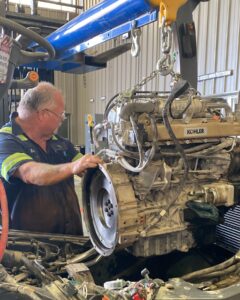
- Good raises & salary (over a lifetime of work with the same company)
- Full company vestment in your 401k (better retirement savings)
- Access to benefits like PTO, health insurance, term life insurance, etc.
It gives you a lot of job security.
- Unemployment is less of a concern with tech jobs than with administrative positions
- Companies like Hugg & Hall are always looking for techs with good problem-solving skills and a strong work ethic!
What does it take to become an Equipment Mechanic?
There are two main routes: trade school or internal advancement.
Trade School
Your options for a certificate or associate degree will be different based on where you’re located, but if you’re taking this route, there’s some overlap in helpful degree programs.
Helpful degrees or certificates include, but aren’t limited to:
- Heavy Equipment Maintenance
- Equipment Systems Technology
- Construction Technology
- Diesel Technician Training
- Automotive Systems Technology
Rely on the intake/admissions specialists at these institutions. They can help you figure out which of their degree programs are right for you.
If you don’t have any luck with technical schools or community colleges, consider looking at training with equipment companies. Some offer training specifically on their equipment, so if you’ve got a brand in mind, research their training programs to see what they offer.
Internal Advancement with a HS Diploma/GED
With companies like Hugg & Hall, you’ll get on-the-job training that helps you advance. For advancing within a company, you’d start with an entry-level job, like Hugg & Hall’s Equipment Inspector or Shop Helper positions.
Rental Equipment Inspector
At Hugg & Hall, Rental Equipment Inspectors get an introduction to working on rental equipment as it comes back from, and goes to, different jobsites.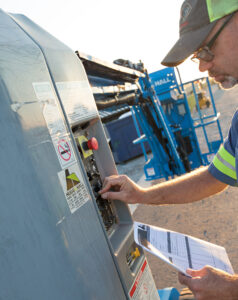
Their responsibilities include, but aren’t limited to, the following:
- Making sure returned rental equipment is undamaged, clean, and safe for the next client
- Checking basic equipment stats like fluid levels
- Communicating with the Fleet Maintenance Coordinator to expedite repairs
- Maintaining yard cleanliness and organization
Rental Equipment Inspectors are likely to become Rental Shop Techs, since they already have a good, established relationship with the Rental team. After more training, they’re capable of moving to Rental Field Service Techs.
Shop Helper
If the company you’re looking at doesn’t have a Rental team, you’ll want to apply for something in their service shop.
Shop Helpers assist techs in four main ways:
- Retrieving and delivering parts to techs
- Assisting techs as they work on equipment
- Clean and prep equipment for delivery
- Maintain shop cleanliness and organization
These four responsibilities give Shop Helpers an intro into the work technicians do.
If you are in this role (or a similar one), you’ll have opportunities to learn more about equipment and go through training from other techs and equipment manufacturers. It’s also a position that allows you to move into a Shop Tech role without an overwhelming job change.
No matter which route you choose, you’ll be able to enter the field of equipment maintenance with confidence and technical know-how.
What will your Equipment Mechanic career path look like?
Here’s an example of what your career path might look like.
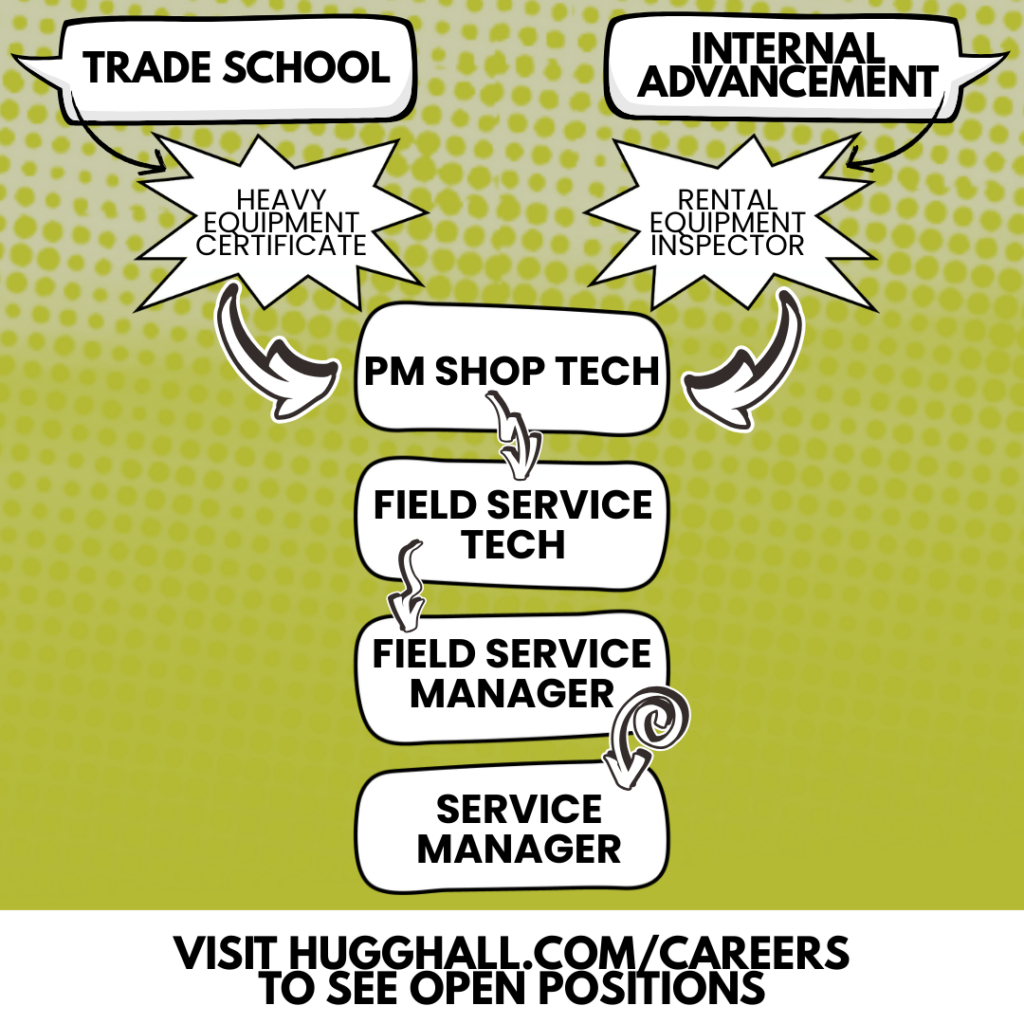
This isn’t an iron-clad path, though. Vivian Webb, VP of HR, said, “Even trade school grads may start in a Shop Helper or Shop PM Tech role to allow for observation and mentorship as they receive on-the-job training and factory training.”
After you’ve become comfortable working on many types of equipment, you’re eligible to move on to diagnostic roles like Shop Service Technician, and then Field Service Technician, to allow you to spread your wings.
A role that you might be in during the middle of your career advancement would be a Product Support Sales Coordinator (customer support team members for all a customer’s repair needs, from quote to repair completion), or a Field Service Manager (where you’d be supervising Field Techs).
Companies like Hugg & Hall offer managerial positions in several ways related to service: you could pursue a Shop Manager role, or a Service Manager position, which would put you in charge of the admin work of running the Service team.
You can base your own advancement process on what you’re interested in and what’s available at the time. Companies like Hugg & Hall offer a lot of options, as well as the ability to choose your next step.
Takeaways
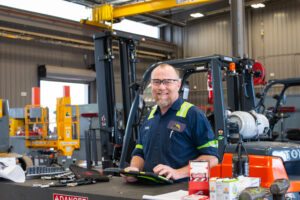
There are a lot of options if you want to become an equipment mechanic! Following this path will open lots of doors for you.
Ready to see if Hugg & Hall is hiring in your area? We’re ready for you! Visit our Careers page!
Back to News
Subscribe and unlock cutting-edge equipment insights, trends and tips!
Subscribe
